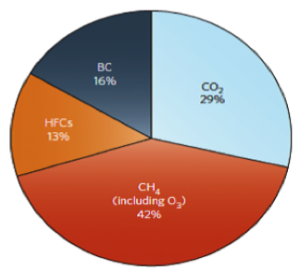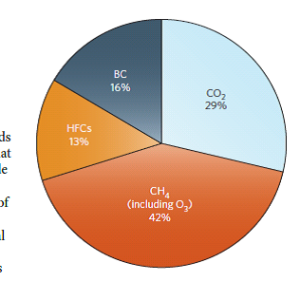Aggressive cuts to HFCs, black carbon & methane can avoid 0.6°C of warming by mid-century
Missing link on global path to limiting warming below 2°C
Sacramento, 30 September 2015 – Following Governor Jerry Brown’s announcement last week, today the California Air Resources Board released the details of its ambitious new strategy to reduce short-lived climate pollutants. The aggressive strategy will cut California’s emissions of methane and HFCs by 40 percent and black carbon by 50 percent by 2030, and is one of the five key pillars of Governor Brown’s strategy to reduce total greenhouse gas emissions by 40 percent below 1990 levels by 2030. “This strategy will be backed up by legislation and will result in detailed and binding regulations,” Governor Brown said of the anticipated strategy last week.
Short-lived climate pollutants, which contribute as much as 40 percent to the current warming rate, include black carbon, hydrofluorocarbons (HFCs), methane, and tropospheric ozone. Because short-lived climate pollutants have a life span of only days to fifteen years, their mitigation benefits will be felt within days to a decade of implementation. Aggressive cuts to short-lived climate pollutants could avoid up to 0.6°C of warming by mid-century, a significant part of the mitigation needed to keep the planet from warming more than 2°C above pre-Industrial levels.
“We’re completely committed,” said Governor Jerry Brown. “We’re mobilizing the science, we’re mobilizing the legislative resources, and whatever else is needed. We will also continue to work with countries like Mexico, India and China to help them deal with air pollution issues.”
Professor Ramanathan, who presented at the UNEP/CCAC event where Governor Brown made the announcement last week, affirmed that over the next 40 years, 86 percent of temperature mitigation will come from short-lived climate pollutants. According to his research, cutting short-lived climate pollutants along with carbon dioxide can also significantly slow sea-level rise, with the short-lived climate pollutants responsible for more than two-thirds of the slowdown by the end of the century.
“Governor Brown understands that we cannot rely solely on long-term CO2 cuts to stop the world from warming above the 2°C guardrail” said Durwood Zaelke, President of the Institute for Governance & Sustainable Development. “Through cuts to HFCs and other short-lived climate pollutants, California is taking the lead down a path toward fast mitigation and demonstrating the health benefits that come with these reductions.”
Authorities around the world are increasingly citing short-lived climate pollutants as an essential strategy to avoid reaching 2°C. The government of Chile, in its Intended Nationally Determined Contribution released earlier this week, recognized cuts to short-lived climate pollutants as a substantial component of addressing climate change.
Support to phase down HFCs through an amendment to the Montreal Protocol is also increasing, with formal proposals now submitted by 95 countries. Many other countries, including China and Brazil have agreed with President Obama to support the HFC amendment. Negotiations to begin the amendment process will reconvene in the United Arab Emirates in late October.
“The near-term benefits of cutting these pollutants are monumental,” added Zaelke. “An HFC phase down under the Montreal Protocol could avoid 100 (87-146) billion tonnes CO2 equivalent, and by making the appliances that replace HFCs super-efficient, we could add another 100 billion tonnes of CO2 equivalent.”
IGSD’s Primer on Short-Lived Climate Pollutants is here and Primer on HFCs is here.



